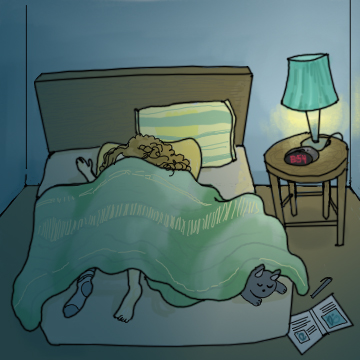As students add to the ever-growing UT family, they remain unaware of many of the biggest roadblocks to their academic careers.
College is the promised land! The best four years of your life! However, the sustained stress of student life can significantly detract from that experience. And while partying all night is certainly fun in moderation, ask anyone on the Texan, the long term effects of lacking sleep can be dangerous to your health. Fatigue deteriorates reaction time, relationships and mental health.
Getting a leg up on managing these two factors early can significantly benefit your college experience — and science offers us some recommendations.
Sleep
Managing sleep is the most seemingly trivial, but important, factor to your success. There is no glory in how many all nighters you can pull and Monsters you can shotgun.
Students sleeping less than six hours a night for two weeks are operating at the same level of efficiency as those who have not slept in 48 hours, according to the American Academy of Sleep Medicine. In fact, there is a strong correlation between student tiredness and GPA; students who sleep more earn better grades, asserts a study by the University of Minnesota. Sleep affects memory, creativity and stress.
Whether you’re memorizing reactions for Ochem, or adding to your architecture portfolio, make sure you’re getting enough sleep.
However, when there’s just not enough time to rest well, skip the Starbucks and opt for a 30 minute power nap instead. While they aren’t perfect substitutes for a good night of sleep, they can boost energy and mental clarity. However, when engaging in this non-REM cycle, try not to oversleep past 30 minutes, as that can make you feel worse, by engaging and breaking REM sleep.
It’s easier to make a good habit than break a bad one. Deposit into your sleep bank while you can, before sleep starts managing you.
Stress
Managing stress is so important that University administration uses part of your tuition money to combat it. UT services such as stress management workshops and the MindBody Labs attack these issues, but it can be hard to make time for these resources.
Simpler strategies such as keeping a schedule or a to-do list can help prevent feeling overwhelmed. Chop your work into smaller bits. Instead of thinking “Study for Exam by Friday” think, “Finish Chapter 1 by Tuesday, Ch. 2 and 3 by Thursday,” and so on. In fact, the Pomodoro technique suggests a five minute break or phone time for every 15-20 minutes of work can actually boost productivity.
Implement these strategies sooner rather than later. Getting into the habit now will give you a solid foundation of discipline to fall back on. College is a lot more fun when you’re not a neurotic zombie.
Batlanki is a neuroscience sophomore from Flower Mound. Follow him on Twitter @RohanBatlanki.





















